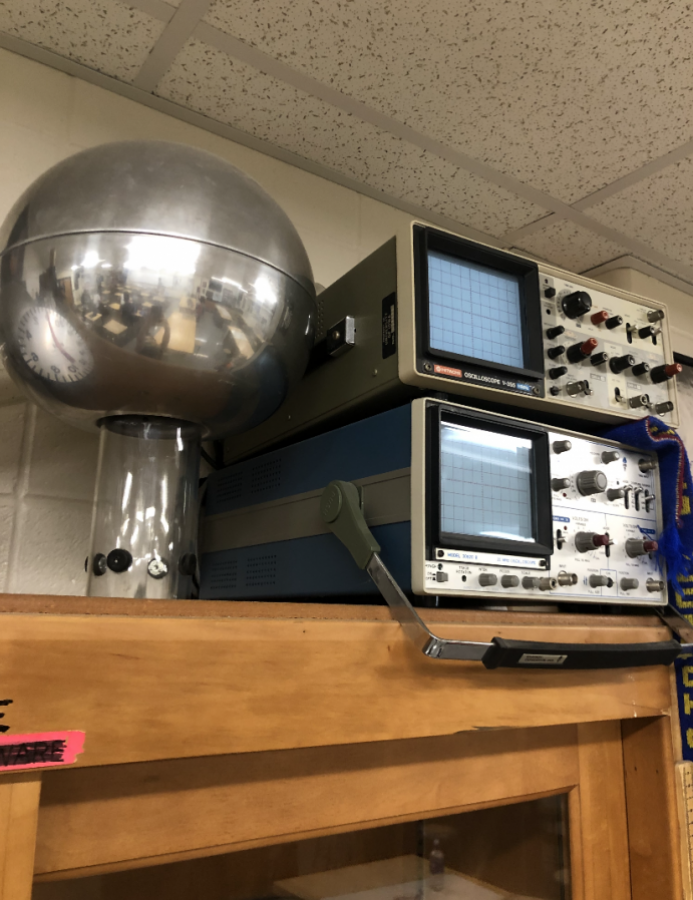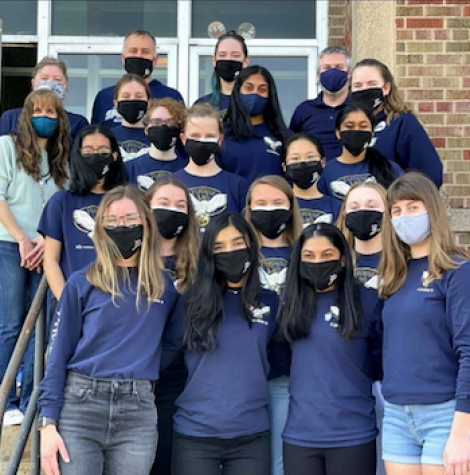AP Physics teacher Ian Spangenberg’s room is filled with scientific equipment and tools.
AP Physics 1: Helpful or harmful?
May 13, 2021
AP Physics 1: Learning about everything under the sun and beyond
When students hear the word physics many turn away in horror and avoidance. The end of the honors science path at PVHS stops many in their honors journey before it has even begun.
AP Physics 1, taught by Ian Spangenberg, is an advanced placement class that most students at PV take during their junior year. The way this class teaches students about complicated phenomena that appears in the real world makes it one of the most fun and interesting courses PV has to offer.
The honors science path at the high school begins with Honors Biology, followed by Honors Chemistry and ends with AP Physics 1. If a student opts out of taking Earth Science separately, they have to follow through with all three classes in order to get the full curriculum of earth science, which is distributed among the three courses. This requirement is mandated by the Iowa Department of Education.
Junior Will Fairman is currently taking the AP course and is preparing to take the exam. Before he started the course, he heard many rumors from upperclassmen. “The biggest rumor I heard was that the subject matter was impossible to learn. While the class was the most challenging I’ve ever taken, with hard work, focus and some enjoyment it becomes fun and easier to do well,” Fairman commented.
Physics is difficult in general because of its math based curriculum. The world of physics brings science and math together, and, for many students, it is their first experience with this. While physics is difficult to conceptualize, if a student puts forth the effort to understand why each equation works the way it does, it is definitely possible to have a little bit of fun in the class.
Spangenberg fills his class with fun demonstrations and labs. Students are able to visualize physics in motion. As time goes on though, the students are able to see physics in the world around them.
It goes without saying AP Physics 1 is a difficult course, but the reason students join the honors path is to be challenged. Students take this course at a time when they have either already learned algebra or are currently learning it, equipping them with all the tools needed to learn physics.
Fairman has taken up the course as a challenge and has found success because of his hard work. “I just studied and asked questions. 8th periods were key for me,” he reflected. “Mr. Spangenberg is one of the greatest teachers I’ve had because of his passion for the subject and his willingness to help students learn. He was always there for me to make sure I learned the topics and did well on exams.”
Senior Aditi Nachnani took the class last year. “AP Physics 1 was not that hard but since it was like any other class that I have studied, it took me a while to get used to the concepts. To get past this difficulty, I would go in during 8th a couple of times before test day to ask questions and review with him,” Nachnani explained. “This helped by grade tremendously.”
Spangenberg is well known for his teaching abilities for the AP Physics 1 and 2 courses. He has an overflowing passion that is contagious to his students. Sometimes students will feel overwhelmed with the information learned in class, but it is worth it for the excitement of learning about the world around them.
Physics essentially covers everything under the sun and beyond. Students will find answers to questions they never knew they had. Though AP Physics 2 is not a mandatory course, many students find themselves back in Spangenberg’s room for a second year, looking to gain more knowledge about the wide world of physics.
AP Physics 1 is difficult, but many of the students who take the honors path want to go on to college or further education to gain a degree. AP Physics is only a small taste of what college is going to be like. Students have to study outside of class and take their education into their own hands. Spangenberg is very helpful and understanding towards students, but if students do not take action and ask for help, there is nothing the teacher can do for them
Two of the main science tracks are physics and life science. Biology covers life science while chemistry covers both aspects of science. AP Physics 1 covers the majority of physical science. With the eye-opening experience AP Physics 1 provides, students are able to explore possible career paths for their futures.
AP Physics 1 pushes students to think in new ways and be curious of how the world works. Honors students join the path to get challenged, and AP Physics 1 is the perfect way to round it out.
The fear of physics: Why students on the science honors track dread their junior year
Access to honors classes is not an issue for students at PV. Students are offered a multitude of courses to choose from, each in varying subject areas. However, there has been one pressing issue for every incoming freshman class: choosing the honors track for science freshman year.
When the curriculum for science courses at the high school changed, students were left with an ultimatum. The science standards required for graduation included learning earth science. However, freshmen were offered the choice of taking Honors Biology or Earth Science their first year of high school.
Freshmen who took the earth science course were able to complete that part of the graduation requirement. But students who chose to take the honors biology course were locked into the honors track for the rest of their high school career.
The curriculum had divided the earth science standards into three parts, each part being embedded into each of the honors courses that students would take throughout their freshman, sophomore and junior years. The main issue surrounding this division is the AP Physics 1 course. This rigorous physics course was not what many students wanted to take.
Students still wanted to be on the honors track starting their freshman year, but the prospect of taking a rigorous AP course their junior year was frightening. If students were to drop out of the honors track at any point, they would have to take the earth science course to complete the graduation requirement.
This requirement poses many issues for both students and teachers. Students who decide to not take the honors track will miss out on courses that they would have otherwise enjoyed, simply because they did not want to be locked into a course they did not have an interest in taking. Teachers will also miss out on teaching eager students with intrinsic motivation to learn.
Junior Allisa Pandit was on the honors track for science but opted to not take AP Physics 1 junior year. “I decided to take General Physics and Earth Science this year because I needed to decrease my workload. I am already taking several AP and honors courses, so I wanted to make sure I still had time for my extracurriculars,” she said.
“I’ve heard past students say how difficult the course is, so I decided it’s probably not the class for me. I know a lot of my peers that ended up taking AP Physics regret it and were not passionate about the class throughout the year. Having to take Earth Science and General Physics at the same time drives more students to stick with AP Physics — even if they don’t want to,” Pandit continued.
Regret is not a useful feeling to have toward a class. Instead of pushing students to do better in the course, like passion does, it pushes them to resent the course and lose motivation to do the work.
Additionally, students who do take the honors track might reach the AP Physics 1 course with no motivation. This is harmful to the students, their classmates and the teacher. Without intrinsic motivation to learn and fully participate in the course, the student will not be able to achieve academically.
Other students in the class will be impacted too. A class filled with people who are not passionate about the course will reflect in the classroom atmosphere: silence, lack of communication and discourse. Ultimately providing students with a poor learning environment.
Senior Sophia Lindquist has felt the impact of unmotivated students in her own classes. “I have been in a couple classes where there was little discussion, but it honestly depended on the class as to whether that helped or hindered my learning. In some cases I enjoyed quiet because it allowed me to focus more on the material presented to me,” she explained.
Those negatives go both ways. It can become more difficult for a teacher to teach a group of students who are not interested in learning the material. The classroom participation will not be the same as if everyone was given the choice to take the class. That simple choice for students goes a long way. Students who want to learn that material will put in the effort to do so, more than students who were locked into taking the class.
Research shows that interest is a driving factor for academic success. The interest, or lack thereof, a student has in a particular course or topic can affect their learning for the better or worse. It needs to be up to the student to make decisions on what courses they want to take, allowing them to choose courses they are truly interested in.
For students on the honors track for science, they are on the path to take AP Physics 1 junior year; one of the most important years for high school students. Juniors and seniors typically have more room in their schedules to take the classes they want to, giving them an opportunity to choose classes that are geared towards their future plans. Taking this opportunity away from them at such an important time is unfair to students.
Lindquist feels as though it is essential for students to have freedom in picking courses. “I don’t believe that locking specific courses is good for learning because it is all dependent on a decision we made as incoming freshmen. Our interests change as we get older, and if we are not interested in that course anymore, we won’t put in the effort for it,” she expressed.
Though many students love AP Physics 1, it is unfair to force students into taking the course. Students who enjoy the course typically were interested in the contents of the class beforehand. This freedom to choose their course has helped students immensely in this class.
For PV, the science honors track has brought forth many issues for students. The freedom to choose classes is crucial for students, especially during their last couple of years in high school. As students come closer to adulthood, the need for classes that are focused on their passions are essential. Locking students into specific courses will be harmful for students, classmates and teachers. In a dilemma between students’ academic freedom and state curriculum requirements, why do schools fail to make decisions that benefit their students?



